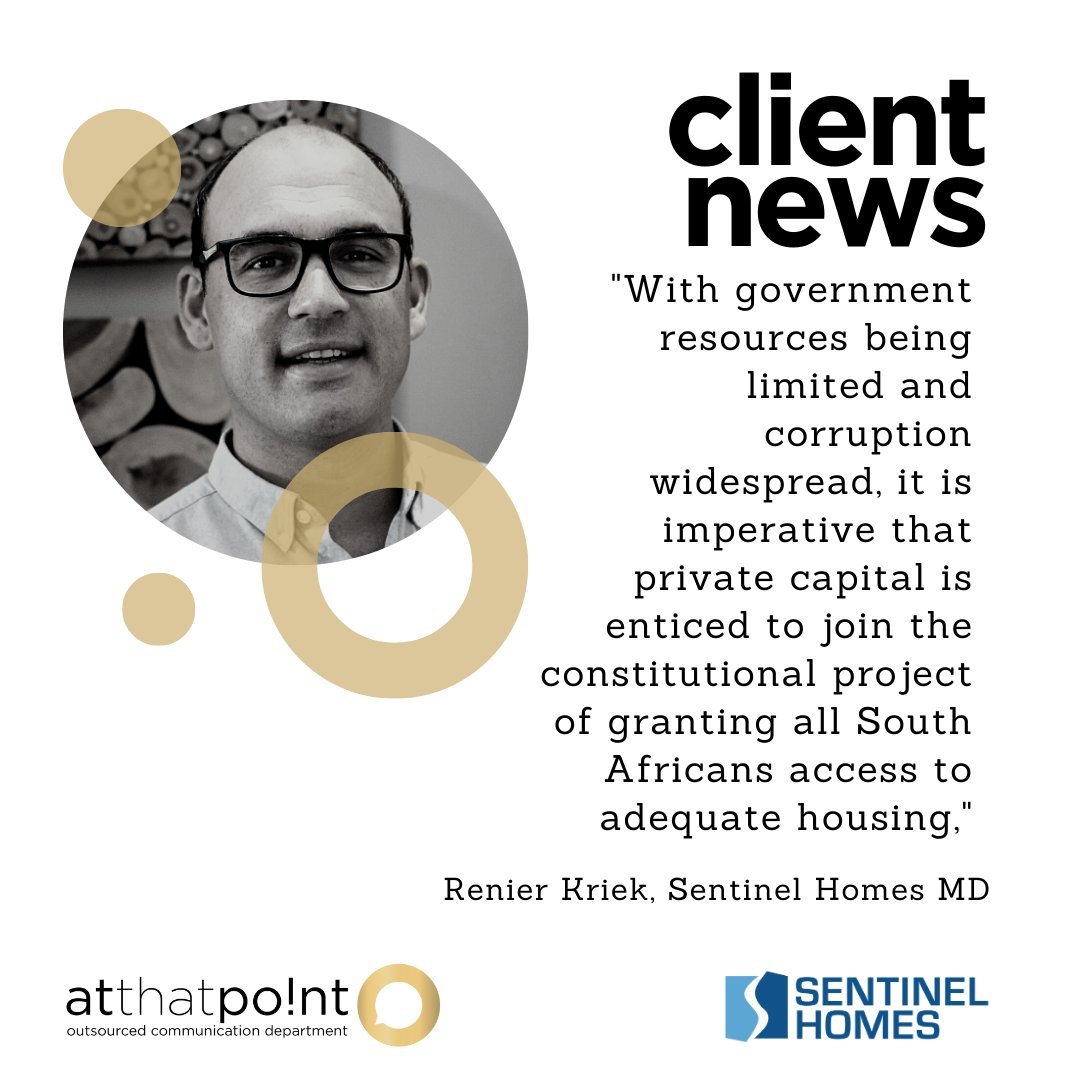 Overregulation of the housing market in South Africa is discouraging the private sector from investing in formal low-cost housing projects. This is according to Renier Kriek, Managing Director at Sentinel Homes. "With government resources being limited and corruption widespread, it is imperative that private capital is enticed to join the constitutional project of granting all South Africans access to adequate housing," he says. It is apparent that, for all the government's initiatives, programmes and subsidies to provide RDP housing, a vast number of underprivileged citizens still reside in informal settlements. However, while tax breaks exist for new or improved rental housing, with added incentives for low-cost housing, the rest of the legal and policy landscape is much less persuasive to investors. Mortgage risk For one, housing consumers who earn less than R15,000.00 per month make up less than 0.6 percent in value and 1.7 percent in number of accounts granted mortgages in Q1 2023, matching a decade long trend. This is because banks tend to avoid these riskier applicants, even when supported by the government's Finance-Linked Subsidy Programme (FLISP). The reason is simple: the excessively long and inefficient foreclosure process in South Africa seems bent on ensuring losses for both banks and defaulting consumers. In addition, judges are often overly sympathetic to defaulting debtors per case, not considering the overall negative effect this has on banks' attitude towards financing the larger underprivileged community. "However, if the cost of terminating defaulting mortgages were low, banks would be less risk averse, thereby increasing the likelihood of access by this segment," says Kriek. Rental risk Similar to mortgages, the time and financial costs of eviction are too high, and the law and courts too lenient on defaulting renters. With the supply of formal housing being so low, the cost of eviction should also be low and the rights of a large number of potential tenants should weigh more heavily than those of a few non-paying tenants. "If the risk was low, more landlords would emerge to invest in satisfying the obvious demand for affordable accommodation," says Kriek. Development rules Lastly, housing development in South Africa is inhibited by long or delayed regulatory processes, as well as building standards designed around first-world circumstances. This is further exacerbated by municipal inefficiency, which affects delivery of essential services like roads, water, power and sanitation. Authorities have also suddenly become deeply concerned with the lack of affordable housing. Their response has been to request that developers include affordable housing units in new developments, even in areas not marked for such housing. "While laudable at first glance, this does not increase the availability of affordable housing as beneficiaries will often flip the unit at market price to realise a profit," says Kriek. The positive intent is therefore negated and leaves the market worse off. Change Is Needed Mortgage risk, rental risk and misguided development rules, taken together, disincentivise the development of low-cost housing in favour of larger, pricier units. "Given the state of the country’s housing market, urgent legal reforms and business-friendly policies are needed to ensure all South Africans gain access to constitutionally mandated housing," says Kriek. ENDS MEDIA CONTACT: Rosa-Mari Le Roux, [email protected], 060 995 6277, www.atthatpoint.co.za For more information on Sentinel Homes please visit: Website: www.sentinelhomes.co.za Facebook: Sentinel Home
0 Comments
 South Africans who have been hesitating to buy a new home due to high interest rates may finally be able to take the plunge. "For the first time since April 2022, the Consumer Price Index (CPI) has fallen back within the Reserve Bank’s target band of between 3-6 percent," says Renier Kriek, Managing Director at Sentinel Homes. According to Kriek, a lower CPI indicates that inflation has potentially peaked. This will likely mean stabilization of the market interest rates and a repo rate reduction could even be on the way. Signs that inflation is falling Since the disruption to world economies caused by COVID-19, several factors subsequently contributed to high global inflation, from which South Africa was not spared. Inflation often occurs because the difference between consumer demand for items and producers' ability to supply them causes their prices to increase too sharply to remain affordable. It may also result from a drop in the relative purchasing value of money due to various economic factors. Inflation in South Africa is measured through the Consumer Price Index (CPI) compiled by Stats SA. The South African Reserve Bank (SARB) follows a policy of keeping any changes in the CPI within a range of 3 to 6 percent year-on-year, preferring to keep it anchored at 5 percent. Even before local CPI breached 6 percent earlier last year, SARB moved to reign in inflation with 10 consecutive increases in the repo rate, to the current level of 8.25 percent. Interest rates consumers are charged on their debt, such as the prime rate, are linked to the repo rate. This means that rises in the repo rate makes repayments on debts like home, car and personal loans more expensive, forcing consumers to curb non-essential purchases and bringing rampant price increases down. However, on 21 July 2023, the SARB's Monetary Policy Committee announced the repo rate would stay unchanged at 8.25 percent, saying it remains cautious. The main reason a further increase was avoided is the drop in the CPI from almost 7 percent in April to only 5.4 percent in July. The July CPI was even lower than what economists predicted. "For consumers, this means that, barring unforeseen increases in inflation, the repo rate will remain steady and might even be reduced in September, when the Committee meets again," says Kriek. Are there homes to buy? The South African economy created 1.2 million new jobs between the first quarter of 2022 and the first quarter of 2023, despite challenges like inflation, loadshedding and poor service delivery. If the repo rate drops as expected, this will put even more money in people's pockets and boost economic activity. In short, things are looking up for South Africans, especially those with their hearts set on buying a home. Although estate agents report a shortage of stock from resilient homeowners desperate to keep their properties, home loan debtors are clearly facing heavy stress from current high interest rates. The National Credit Regulator reports that while the number of mortgages not in arrears are usually around 91 percent of total home loans, the first quarter of 2023 saw a drop to 88.85 percent. The arrears rate has steadily increased as interest rates climbed higher. "Banks will likely be eager to help owners in arrears with payments start the process of selling those properties, meaning we are likely to see increased stock coming onto the market soon,” says Kriek. “The normal stock cycle in the property market will also return if sellers see positive signals, such as stagnation or decline in interest rates. Until that time, sellers are likely to hold out on selling as much as they can to avoid being price takers.” Is it time to buy? Of course, the best time to buy depends on various factors and conditions, changing from region to region, case to case and price range to price range. However, Kriek says for anyone set on semigrating from the northern provinces to the Western Cape or elsewehere on the coast, the time is ripe to buy and they should not wait. Properties selling against home loan debt typically carry an average sales value of around R1.3 million. Properties at this price point and anything below the average price have seen and will continue to yield a respectable return on investment. “Demand very clearly outstrips supply for properties priced below the average,” says Kriek. The exception is properties in the very high range, above R4 million. "I see evidence that prices will come down further so it may be best for prospective buyers in that price range to bide their time until the market bottoms out,” says Kriek. “Of course, there are exceptions, such as Sea Point or Stellenbosch.” Lastly, Kriek advises that, with interest rates having peaked, purchasers should opt for a variable interest rate instead of a fixed interest rate. "Homeowners taking advantage of the eventual drop in the repo rate can enjoy their property while reducing their bond repayments," he says. ENDS MEDIA CONTACT: Rosa-Mari Le Roux, [email protected], 060 995 6277, www.atthatpoint.co.za For more information on Sentinel Homes please visit: Website: www.sentinelhomes.co.za Facebook: Sentinel Homes |
Welcome to the Sentinel Homes Newsroom. BROADCAST INTERVIEWS2023 Archives
July 2024
Categories
All
|

 RSS Feed
RSS Feed